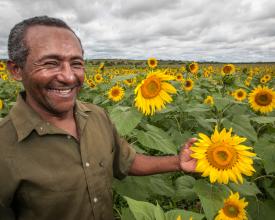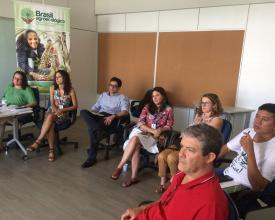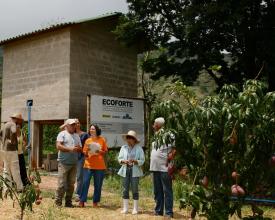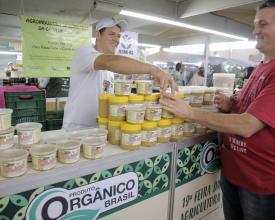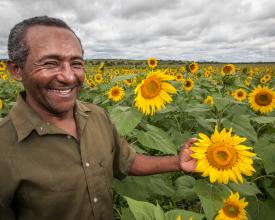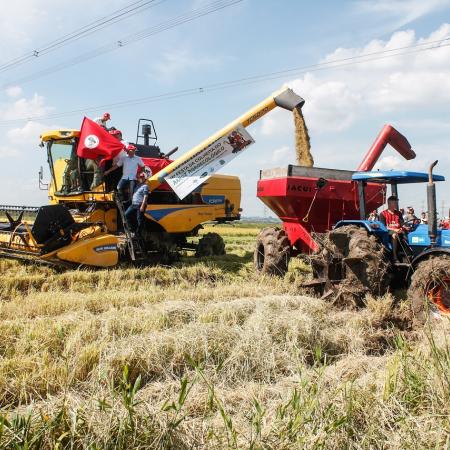
Brazil’s National Policy for Agroecology and Organic Production (PNAPO)
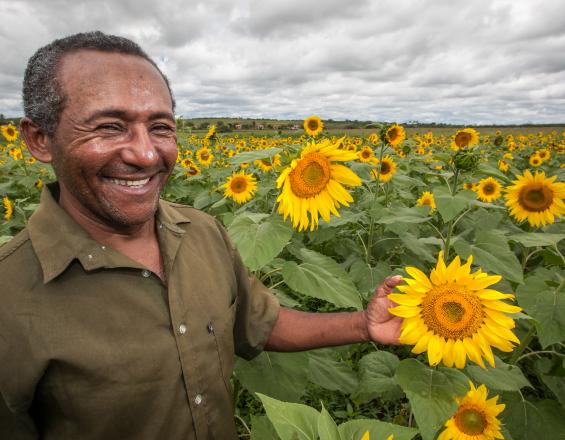
Developed as a result of intense civil society engagement and structured around seven comprehensive guidelines that encompass the most relevant aspects of sustainable food chains and systems, PNAPO is a unique federal framework policy for advancing agroecology and organic production in Brazil. In its first cycle of activities it led to impressive quantitative results in terms of advancing the agroecological agenda in the country (budget and initiative-wise), investing over EUR 364 million, resulting in visible large-scale improvements for smallholders and vulnerable groups. Amongst others, it constructed over 140,000 cisterns and helped 5,300 municipalities to invest 30% or more of their school feeding budgets in organic and agroecological products purchased from family farmers. For its achievements, Brazil’s PNAPO was recognized with the Future Policy Silver Award 2018, awarded by the World Future Council in partnership with FAO and IFOAM – Organics International.
Context
Challenges addressed
It is worthy of notice that the Brazilian agroecological movements encompass actors from multiple spheres of society, e.g. peasant youth and women, landless workers, traditional communities. They date back to the 1970’s social movement for an alternative agriculture, which was one of the first to formally address in country the problems related to the environmental degradation caused by the Green Revolution and its impacts on food production. This movement was then strengthened by the arrival in Brazil of specific scientific literature on agroecology and by the creation of certain organizations, such as the AS-PTA, ANA and ABA. In the mid-1990s, “the Brazilian agroecological movement made significant strides, gaining ground among social movements, NGOs, higher education and research institutions, as well as in technical support and rural extension programs”. Agroecological demands have thus acquired momentum in the country over the past fifteen years.
Location
Process
Summary of the process
Developing a pioneer framework policy on agroecology (BB1) has been the basis for setting up institutions for the coordination of measures (BB2) and implementing the policy (BB3). Together these builidng blocks built PNAPO's potential as a transferable model (BB4).
Building Blocks
Developing a pioneer framework policy on agroecology
The National Policy for Agroecology and Organic Production (PNAPO) is a pioneer Brazilian national public policy on agroecology. It was enacted through a participatory process, in which civil society played a pivotal and leading role in pushing forward the agenda and in ensuring that some relevant demands were effectively included in the policy’s final text.
On 20th August 2012, the PNAPO was adopted by President Dilma Rousseff, by means of the Federal Decree No 7,794. It is relevant to point out that within the Technical Board for Organics (CT-ORG) there was in the early 2010s a proposal to create a national policy on organic agriculture. However, with the decision of the President to establish a policy on agroecology, both issues were incorporated into the same agenda.
During the enactment process of the policy, the most relevant spaces for dialogue between the Government and civil society were the five Regional Seminars (from February to April 2012) and the National Seminar (May 2012) entitled “For a National Policy on Agroecology and Organic Production” jointly organized by ANA and ABA with the support of the Ministry of the Environment (MMA).
Enabling factors
As a result, civil society (farmers, civil society organizations, etc.) had become increasingly articulated over the years, thanks to the National Encounters and the Brazilian Congress of Agroecology, and finally, ANA formulated the document “Proposals of the National Articulation of Agroecology for the National Policy on Agroecology and Organic Production”.
Lesson learned
In 2012, the National Council on Food and Nutrition Security (CONSEA)* forwarded to the Presidency the Explanatory Memorandum No 005-2012, supporting the approval and effective implementation of PNAPO. Given all that, in May 2012, the meeting “Dialogues between Government and Civil Society” was held by the Federal Government to engage civil society in the draft of the latest version of PNAPO’s text. It is relevant to stress that not all the civil society priorities and demands were in fact incorporated into the definitive text of Decree No 7,794. Nonetheless, PNAPO still represented a milestone in Brazilian policies for rural development and an accomplishment of the Brazilian agroecological social movements. All in all, PNAPO has established at the national level a set of provisions and guidelines regarding the promotion of agroecology, outlining a legal and political pathway for the promotion of more sustainable, socially inclusive, environmentally friendly food production systems in the country.
* Sadly, the new Government abolished the CONSEA at the beginning of 2019
Setting up institutions for the coordination of implementation
Responsible for the implementation of PNAPO are the Interministerial Chamber of Agroecology and Organic Production (CIAPO) and the National Commission of Agroecology and Organic Production (CNAPO):
The CIAPO is the government body composed of nine Ministries and six invited Independent State Agencies. It is coordinated by the Special Secretariat for Family Farming and Agrarian Development (SEAD), which also provides technical and administrative support. CIAPO’s attributions are: building up and executing the National Plan for Agroecology and Organic Production (PLANAPO), coordinating the Government Bodies and Entities committed to PNAPO’s implementation, promoting liaison among and with State, District and Municipal Bodies and reporting to the CNAPO on the monitoring of the PLANAPO.
The CNAPO, on the other hand, represents the government-civil society liaison. It is composed of fourteen representatives from the public administration and fourteen representatives from civil society organizations, each one with a designated alternate representative. It is coordinated by the Secretariat of Government of the Presidency of the Republic (Segov), through the National Office of Social Articulation (SNAS), which also provides technical and administrative support.
Enabling factors
As PNAPO’s overall aim is to integrate and articulate policies, programmes and actions for the promotion of agroecological transition, it is a key success factor that it is governed by the Interministerial Chamber of Agroecology and Organic Production (CIAPO) and the National Commission of Agroecology and Organic Production (CNAPO). In the latter 50 per cent are civil society representatives.
Lesson learned
Currently Brazil is facing a rather intricate political and economic situation. PNAPO’s second cycle, PLANAPO 2016-2019, is still ongoing, but due to political turmoil in the country and a severe economic crisis (2014-2016), it faces drastic budget cuts that hamper its implementation. Nonetheless, much was achieved and PNAPO’s bodies have continued working and secured some funding.
Besides the aforementioned problems, the current President Bolsonaro and his administration have been making controversial decisions regarding to the environment/food sector, and been approving several highly toxic pesticides. Decisions that are not in line with the goals of PNAPO.
Implementation of PNAPO
The National Policy (PNAPO) has been implemented in Brazil since 2012, aiming at fostering sustainable agricultural practices and healthy food consumption habits; empowering family farmers, traditional communities, women and youth; and promoting sustainable rural development through specific programs and financing for smallholder farming. It is a multi-sectoral and multi-stakeholder interdisciplinary policy on a federal level, whose initiatives have been implemented throughout the five Brazilian regions, with verifiable results.
Some programmes and initiatives currently included in the flagship of PNAPO already existed before its creation. Nonetheless, with the establishment of the policy and the creation of CNAPO, those programmes have been strategically articulated and integrated into PNAPO’s general objectives and working plan, guaranteeing more participative planning, implementation and monitoring processes.
One of the PNAPO’s main instruments is the National Plan for Agroecology and Organic Production (PLANAPO), which must always include at least the following elements: overview/diagnosis, strategies and goals, programmes, projects, actions, indicators, deadlines and a management structure (Article 5 of Federal Decree 7,794).
Enabling factors
The main goals and initiatives of PLANAPO are to strengthen agroecological and organic production networks, increase the supply of Technical Assistance and Rural Extension (ATER), focusing on agroecological practices; increase access to water and seeds, strengthen government procurement of products, increase consumers’ access to healthy food, without the use of agrochemicals or transgenics in agricultural production, thus strengthening the economic value of the farming families. PLANAPO seeks also to expand access to land.
Lesson learned
Despite “civil society proposals have not been fully included in the final version of the PLANAPO, there is a general consensus on the fact that the Plan marks an historic moment, an important step forward in the direction of a more sustainable peasant agriculture, especially in a country such as Brazil where the agribusiness model still keeps on maintaining a great influence on government policies, due to its economic importance”.
According to ANA, there are several good points to be highlighted in the first PLANAPO (2013-2015). Among the positive aspects are the actions that had a budget for implementation and which made an important contribution to the advancement of agroecology. Among the negative aspects of the first PLANAPO are the very small budget for policies such as the Ecoforte Programme and Technical Assistance and Rural Extension.
Potential as a Transferable Model
According to Costa et al, “Brazil was the first country in the world to implement a National Policy for Agroecology and Organic Production”. It is therefore worthy of notice that the Policy has been widely implemented in the country, succeeding as a good example of a multi-sectoral public policy, despite the challenges it still faces. Furthermore, PNAPO has served as inspiration for Brazilian States (such as Minas Gerais, Rio Grande do Sul, Goiás, São Paulo and Amazonas), the Federal District and Municipalities to elaborate their own state and municipal policies, following the guidelines of the National Policy and adapting them to their own realities and necessities. Hence PNAPO is likely suitable to be transferred to other situations.
Enabling factors
Indeed, there were many exchanges with other Latin American countries, thanks to (and within) REAF – Rede Especializada da Agricultura Familiar. Within this context, a number of the strategies, initiatives and programmes set out by and developed under the umbrella of the PNAPO, such as the Segunda Água Programme and the public calls for ATER, are highly transferable to other countries with common characteristics and issues, with emphasis to those from the global south with large agricultural areas.
Lesson learned
In particular, Brazil’s National School Feeding Programme has been recognized by various actors (UNDP, WFP, FAO) and has spiked interest from governments in Asia, Africa and Latin America.
Impacts
PLANAPO led to impressive quantitative results in terms of advancing the agroecological agenda in Brazil. Among the numerous important outcomes of PLANAPO 2013-2015 and PNAPO we can highlight that it constructed 143,000 cisterns (initial goal was 60,000); assisted 5,300 municipalities to spend 30 per cent or more of their school meal programme budget on purchases of organic and agroecological products from family farmers (some municipalities even reach 100 per cent); assisted 393 rural family farming organizations; launched several public calls that enabled agroecological organizations to expand their staff on an unprecedented scale benefitting about 132,744 farming families; trained 7,722 technicians (initial goal was 2,000) and 52,779 farmers (one third of initial goal of 182,000); promoted 24 networks for agroecology; trained 960 professionals and political leaders on financing women in organic and agroecological agriculture, which benefitted 5,200 rural women in 20 different Brazilian States; supported 556 women’s networks, benefitting 5,566 rural women; adapted 600 native seeds banks to semiarid conditions and trained more than 12,000 farmers families hereon; and financed nine projects for seeds for agroecology.
Beneficiaries
PLANAPO led to impressive quantitative results in terms of advancing the agroecological agenda and has likely improved the lives of millions of people, ie it constructed 143,000 cisterns, assisted 5,300 municipalities and trained 200,000 farmers.
Sustainable Development Goals
Story

I am Emerson Giacomelli. I am one of the peasants settled by the Brazil Agrarian Reform policy in the Chapel Settlement in Nova Santa Rita. The municipality is part of the Metropolitan region of Porto Alegre, in Rio Grande do Sul.
I am the son of small farmers of Ronda Alta, in the North region of Rio Grande do Sul. I got to know the Landless Workers Movement (MST) in 1985, when they occupied the old Fazenda Annoni, which is a symbol of the fight for land in my country. For believing in this fight, I camped in 1989 and five years later I was settled.
Today, I am President of the Cooperative of Settled workers from Porto Alegre (COOTAP) and I coordinate the Agroecological Rice Management Group, which brings together 363 families of the MST. In 2019, we estimate to harvest approximately 16 thousand tons of organic rice, in an area of 3,433 hectares, in 13 settlements and 15 municipalities. These data place the MST as the largest producer of organic rice in Latin America.
The productive, industrial and commercial processes are coordinated by COOTAP. We work with different cooperatives, such as the Cooperativa de Produção Agropecuária Nova Santa Rita (COOPAN), Cooperativa de Agropecuária de Assentados de Tapes (COOPAT), and others.
The National Policy on Agroecology and Organic Production (PNAPO) was fundamental to the development of our project, since we accessed the Food Acquisition Programme (PAA), the National School Feeding Programme (PNAE) and Technical Assistance and Rural Extension (ATER), and other agroindustries. We were able to plan production, to enable families to stay in the field with work and income, to ensure the marketing of products and gain knowledge to improve the relationship between producer and consumer.
We sell rice in several states of Brazil and have exported since 2008 to several countries. We are now looking for new markets in Greece, Portugal, Spain, the Netherlands, the United Arab Emirates, China, Haiti, Jamaica, Costa Rica, among other places.However, with the current federal government, we are concerned about the possibility of extermination of these programmes that have helped us to develop a new type of agriculture that respects soil, water, air and all forms of life. The PAA has been weakened and we fear that the PNAE will have the same fate. The end of them represents less income, work, development, quality of life and will result, of course, in more migration to the big cities.

